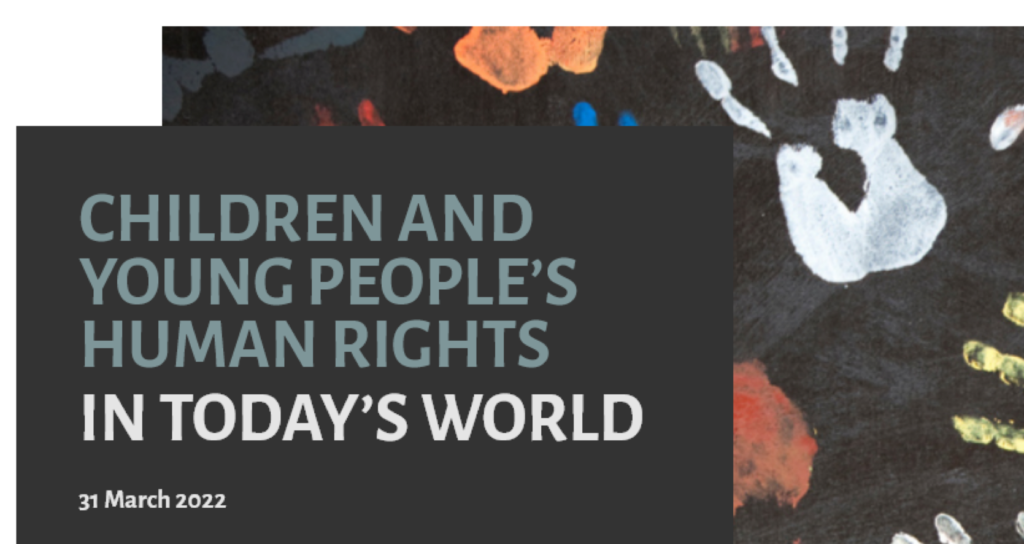
by Dr Holly Doel-Mackaway
On 31 March 2022 the LAWASIA Human Rights Committee’s Webinar ‘Children and young people’s human rights in today’s world’ was attended by over 130 people from 26 different countries. The webinar examined the key children’s rights challenges facing the world and the Asia-Pacific region and discussed some inspiring examples of where children’s rights are being fought for and significant advances made. A summary of some of the issues discussed is provided below.

Expert Counsellor | LAWASIA Human Rights Committee
AUSTRALIA
Dr Holly Doel-Mackaway spoke with three leading children’s rights experts about the status of children and young people’s human rights in the world today:
- Mikiko Otani (Chairperson of the United Nations Committee on the Rights of the Child, Japan)
- Dr Rukmini Banerji (CEO Pratham Education Foundation, India) and
- Sharmila Sekaran (Chairperson of Voice of the Children, Malaysia).
VIEW SPEAKER BIOGRAPHIES WATCH WEBINAR RECORDING
The Child Rights Context Today
The webinar identified that we are currently experiencing a very bleak time for children’s rights globally. UNICEF describes the COVID-19 pandemic as the ‘biggest global crisis for children’ that has rolled back ‘virtually every measure of progress for children’ plunging 100 million more children into poverty. Children globally are experiencing many egregious breaches of their human rights. Some of the most pressing children’s rights concerns across the Asia-Pacific region are the multi-dimensional impacts of climate change, of poverty, the millions of children who have no access to education or health care, child marriage, child labour, the impact of war and conflict, discrimination, political persecution and the millions of refugees, asylum-seekers and internally displaced people, so many of whom are children and young people.
One of the greatest social and legal challenges facing the world today is the persistently high rates of violence against children, including sexual violence, particularly against girls, occurring in the home, on the street, online and in schools. The global community needs to do far more to implement the Convention on the Rights of the Child at the domestic level to address these children’s rights abuses. The United Nations Committee on the Rights of the Child has condemned many jurisdictions for their failure to respect, promote and fulfil children’s rights in accordance with the Convention on the Rights of the Child.

Chairperson | United Nations Committee on Rights of the Child
JAPAN
What did Ms Mikiko Otani say?
Ms Otani discussed the many children’s rights challenges facing the world today and emphasised that because of her long engagement with human rights bodies her sharp ‘focus is on the rights of women, children and migrants’ and stressed her commitment to focussing on three areas: ‘girls, child participation and access to justice for children’. Ms Otani said: ‘any efforts to protect human rights and achieve gender equality begin with children … protecting children’s rights can make the entire society more just, peaceful, inclusive and sustainable’ and adding to this ‘integrating a child rights perspective will strengthen the implementation of the 2030 Agenda for Sustainable Development’.
Referencing her important October 2021 Statement at the General Assembly, Ms Otani spoke of her grave concerns about the impact of the Covid-19 pandemic on children, the alarming increase in child poverty and the adverse effects of climate change on the life trajectory (see also the Committee on the Rights of the Child’s General comment No. 26 on children’s rights, the environment and climate change).

Chief Executive Officer | Pratham Education Foundation
INDIA
What did Dr Rukmini Banerji say?
Dr Banerji spoke about a radically different model of education she pioneered for which, among other things, she won the 2021 Yidan Prize for Education Development. Dr Banerji’s spoke about how the Pratham Education Foundation (Pratham means ‘first’ in Sanskrit) has been able to achieve lasting, wide-scale success in changing India’s educational landscape through the delivery of the Annual Status of Education Report (ASER) that she began in 2005. The ASER Report is a household-based, citizen-led survey of unprecedented scale, assessing 600,000 children’s schooling status and basic reading and arithmetic skills in practically all rural districts in India over a 100-day period each year. This is an astonishing educational achievement and since Dr Banerji began this program many other countries have adopted this assessment method leading to excellent educational outcomes for children across the world.
Dr Banerji spoke about the impact of COVID-19 on children’s education over the last two years given lockdowns and home-schooling. She said the pandemic has led to the most significant and unprecedented disruption to children’s education globally and many children have missed out on nearly two years of education – education they may never regain, including many children who will never return to school. However, she said there have been some unanticipated positive implications resulting from the pandemic and emphasised how lockdowns ‘changed homes into classrooms’ and many parents became closely aware of, and often deeply engaged in, their children’s education. Dr Banerji said this filled a missing link in children’s education and has paved the way for ongoing parental engagement in children’s education, which she says, is overwhelmingly positive.

Founder | Voice of the Children
MALAYSIA
What did Sharmila Sekaran say?
Ms Sekaran spoke about the work of Voice of the Children on children’s participation and children’s right to freedom from abuse, violence and exploitation. Ms Sekaran spoke about the hidden problem of child marriage in Malaysia and the likelihood that there are many child marriages that have taken place informally. In 2019 Voice of the Children made a documentary about child marriage in Malaysia called ‘Stolen Futures’ where Ms Sekaran spoke with children who had experienced this form of exploitation and abuse.
Ms Sekaran also spoke about the impact of the pandemic and the increase in control orders on children and young people’s movement in society. She said many more children have come into contact or conflict with the law because of these control orders. Voice of the Children have identified that protecting children from coming into conflict with the law is an urgent area of law reform and is symptomatic of the need for structural reform within Malaysia’s juvenile justice system. This includes the need to train magistrates and lower court judges about children’s rights and the centrality of the Convention on the Rights of the Child when adjudicating matters concerning children.
We encourage you to watch the webinar which concluded with advice from each of the panellists about what role lawyers and other professionals can play in advancing children’s rights across the region.
The Human Rights Committee of LAWASIA are grateful to Ms Otani, Dr Banerji and Ms Sekaran for sharing their insights at this important forum and we hope these insights translate to many ripples of children’s rights advocacy and advancements in court rooms and throughout our respective communities.
